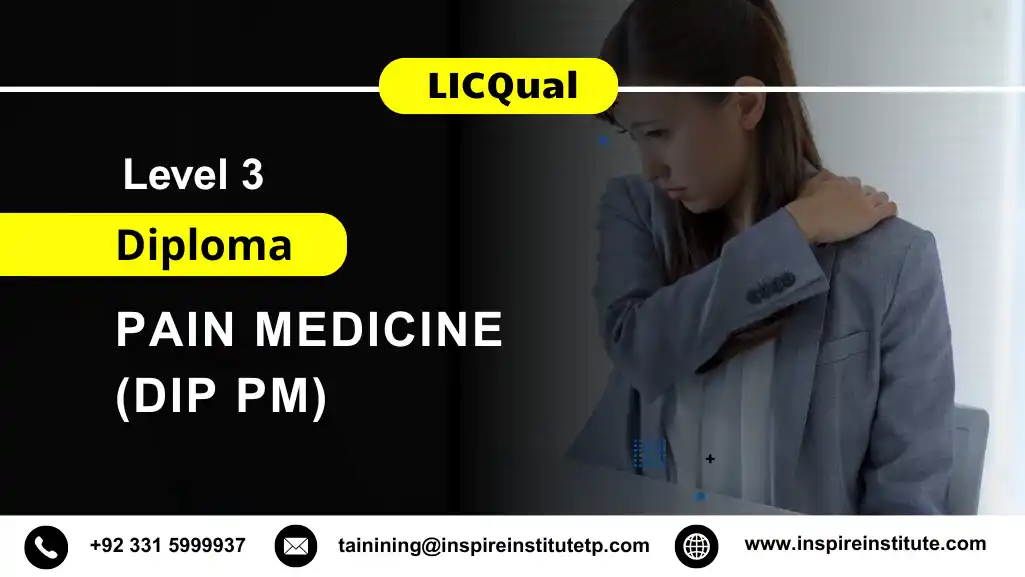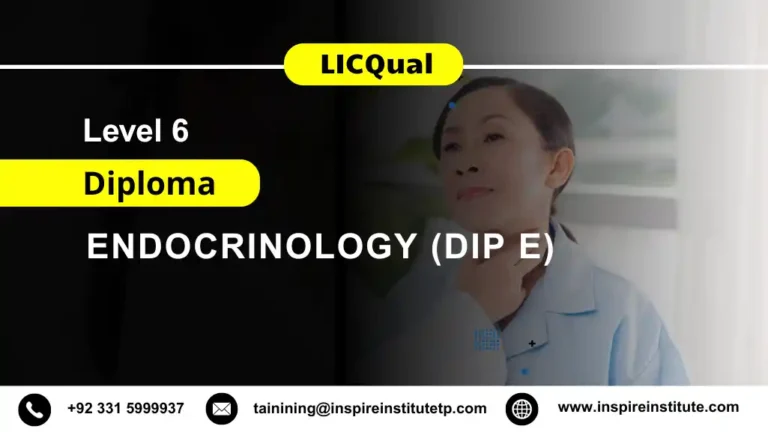LICQual Level 3 Diploma in Pain Medicine (Dip PM)
The LICQual Level 3 Diploma in Pain Medicine (Dip PM) is a UK-accredited qualification designed to equip healthcare professionals, nurses, and clinical practitioners with a comprehensive understanding of pain assessment, diagnosis, and management. Pain medicine is a rapidly evolving field that plays a vital role in improving patient quality of life and reducing the burden of chronic and acute pain conditions. This course provides learners with evidence-based knowledge, practical skills, and clinical insight to effectively manage pain using multidisciplinary approaches in diverse healthcare settings.
The Pain Medicine Diploma focuses on the mechanisms of pain, including neurophysiological, psychological, and pathological factors influencing patient perception and response. Learners gain a deep understanding of pain assessment tools, pharmacological and non-pharmacological interventions, and the latest advancements in chronic pain management, acute pain care, and palliative pain control. The curriculum ensures learners are equipped to make informed clinical decisions and deliver holistic, patient-centred care across a range of clinical environments.
Throughout the LICQual Level 3 Diploma in Pain Medicine, students explore essential topics such as the neurobiology of pain, pain modulation, analgesic pharmacology, and interventional pain procedures. The course Pain Medicine also covers ethical considerations, patient communication, and the psychological aspects of pain, enabling learners to provide compassionate and effective pain management. These areas of study are crucial for those working in hospitals, pain clinics, and rehabilitation centres.
This UK-recognised Pain Medicine qualification adopts an assignment-based learning format, allowing flexibility for working professionals to study at their own pace. Learners apply theoretical concepts to real-world clinical situations, developing analytical thinking, problem-solving, and decision-making skills essential for effective pain management. The course structure supports both independent study and guided academic mentoring, ensuring high standards of education and professional development.
Graduates of the LICQual Pain Medicine Diploma will gain the competence to support multidisciplinary healthcare teams in designing, implementing, and evaluating pain management plans. The programme’s evidence-based approach prepares learners to address complex pain conditions, improve treatment outcomes, and enhance overall patient wellbeing. Whether managing post-surgical pain or chronic musculoskeletal disorders, graduates will be able to apply their knowledge to a wide range of clinical scenarios.
By completing the LICQual Level 3 Diploma in Pain Medicine (Dip PM), learners will earn an internationally recognised qualification that enhances professional credibility and career advancement. This course empowers healthcare professionals to become skilled pain management practitioners capable of integrating scientific knowledge, clinical experience, and ethical care practices. The qualification opens pathways to roles in clinical pain management, rehabilitation, nursing, and research, contributing to the global effort to improve patient comfort and quality of life.
Why Choose this Qualification
The LICQual Level 3 Diploma in Pain Medicine (Dip PM) is a UK-accredited qualification designed to empower healthcare professionals with the clinical knowledge, technical expertise, and evidence-based understanding needed to manage pain effectively. In modern healthcare, pain medicine plays an essential role in improving patients’ quality of life, reducing suffering, and enhancing recovery outcomes. This programme Pain Medicine is ideal for nurses, physicians, paramedics, and allied health practitioners seeking to specialise in pain management and apply clinical reasoning in diverse healthcare settings. The qualification provides an academic foundation and practical framework for delivering patient-centred, ethical, and holistic care.
Key Reasons to Choose this Qualification
1. Comprehensive Understanding of Pain Mechanisms
- Gain in-depth knowledge of the physiological, neurological, and psychological foundations of pain.
- Understand the distinctions between acute and chronic pain, neuropathic pain, and referred pain.
- Learn about pain transmission pathways and how they influence patient perception.
- Explore evidence-based approaches to assess and interpret pain responses.
- Develop the competence to link clinical symptoms with underlying biological mechanisms.
2. Evidence-Based Clinical Practice
- Study the latest research and guidelines in pain medicine and management.
- Learn to integrate scientific evidence into clinical decision-making for improved patient outcomes.
- Understand pharmacological and non-pharmacological treatment options for pain relief.
- Apply critical thinking to evaluate new developments in analgesic therapies.
- Gain confidence in adopting safe, ethical, and effective care practices.
3. Practical Application and Skill Development
- Acquire hands-on skills in pain assessment, diagnosis, and treatment planning.
- Learn to monitor patient progress and adjust management strategies accordingly.
- Understand the practical use of analgesics, nerve blocks, and rehabilitation interventions.
- Develop proficiency in multidisciplinary team collaboration for effective pain control.
- Apply theoretical knowledge to real-world healthcare scenarios.
4. Enhanced Career Opportunities
- Earn a UK-recognised qualification in Pain Medicine that strengthens your professional profile.
- Access global employment opportunities in hospitals, pain clinics, and rehabilitation centres.
- Position yourself for career advancement in clinical care, research, or education.
- Stand out as a competent practitioner in pain management and patient rehabilitation.
- Build the foundation for higher-level qualifications or specialisation in medical sciences.
5. Flexible and Accessible Learning Pathway
- Study at your own pace through an assignment-based assessment structure.
- Balance your academic goals with personal and professional responsibilities.
- Access online learning materials, expert guidance, and continuous academic support.
- Benefit from a structured, outcome-based curriculum that promotes self-directed learning.
- Experience flexibility without compromising on academic rigour or quality.
6. Development of Professional and Ethical Competence
- Learn to uphold patient dignity, confidentiality, and informed consent in clinical practice.
- Understand the ethical dimensions of pain management and medication use.
- Develop empathy, communication, and professionalism in patient interactions.
- Enhance decision-making skills guided by evidence, compassion, and responsibility.
- Build integrity and leadership qualities essential for healthcare environments.
7. Interdisciplinary Learning Approach
- Gain insight into how multiple medical disciplines collaborate in pain management.
- Learn from case studies involving anaesthesiology, physiotherapy, and psychology.
- Understand the roles of healthcare teams in acute, chronic, and palliative pain care.
- Develop teamwork and coordination skills vital for multidisciplinary healthcare delivery.
- Promote integrated approaches that optimise patient outcomes and recovery.
8. Contribution to Improved Patient Outcomes
- Develop the ability to design and implement personalised pain management plans.
- Learn to evaluate the effectiveness of interventions and adjust care plans accordingly.
- Support long-term patient wellbeing through effective pain control strategies.
- Empower patients through education, rehabilitation, and self-management techniques.
- Contribute to public health goals by reducing the impact of chronic pain on communities.
In conclusion, the LICQual Level 3 Diploma in Pain Medicine (Dip PM) provides learners with a strong academic foundation, practical experience, and ethical understanding of modern pain management. It prepares professionals to deliver compassionate, evidence-based care that alleviates suffering and enhances patient quality of life. By enrolling in this qualification, learners not only strengthen their clinical expertise but also contribute meaningfully to the advancement of healthcare and patient recovery worldwide.
Course Overview
LICQual UK Awarding Body
Average Completion Time:
4-12 Months
Study Units: 6 Units
Evidence & Assignment Based
Mandatory Units
Who Should Take This Course
The LICQual Level 3 Diploma in Pain Medicine (Dip PM) is a UK-accredited qualification designed for individuals who wish to develop advanced expertise in pain management, diagnosis, and patient care. Pain medicine is a critical and growing field within healthcare that demands a multidisciplinary approach to improve patient comfort, functionality, and quality of life. This course provides healthcare professionals, nurses, and aspiring practitioners with the essential skills to assess, treat, and manage pain through evidence-based techniques and holistic care strategies. By combining theoretical learning with practical application, it empowers learners to become competent and compassionate pain management specialists in both clinical and community settings.
This Course is Suitable For
1. Healthcare Professionals Seeking Specialisation in Pain Management
- Ideal for doctors, nurses, and allied health professionals aiming to specialise in chronic and acute pain management.
- Enhances clinical expertise in pain assessment, diagnosis, and multidisciplinary care delivery.
- Provides practical tools to implement effective pain control strategies for diverse patient populations.
- Strengthens professional competency to handle complex pain cases ethically and efficiently.
- Offers a recognised qualification to support professional growth in healthcare.
2. Nurses and Paramedics Working in Clinical Settings
- Designed for nursing and paramedical staff involved in perioperative, emergency, or rehabilitation care.
- Equips learners with skills to identify, evaluate, and manage pain in surgical and post-surgical patients.
- Builds confidence in administering and monitoring analgesic treatments safely.
- Promotes evidence-based nursing interventions for effective pain relief.
- Encourages collaborative practice with physicians and multidisciplinary teams.
3. Physiotherapists and Rehabilitation Specialists
- Ideal for practitioners seeking to expand their understanding of pain mechanisms in rehabilitation contexts.
- Focuses on physical and therapeutic approaches to alleviate musculoskeletal and neuropathic pain.
- Enables learners to design personalised treatment plans that integrate manual therapy and pain education.
- Enhances patient engagement and functional recovery outcomes.
- Strengthens coordination between physiotherapists and pain management teams.
4. Medical and Health Science Students
- Beneficial for learners pursuing careers in medicine, nursing, or healthcare sciences.
- Provides foundational knowledge of pain physiology, assessment techniques, and management models.
- Prepares students for advanced studies or clinical roles in anaesthesiology and pain medicine.
- Encourages the development of analytical, diagnostic, and problem-solving skills.
- Offers a competitive advantage in the healthcare job market through a UK-recognised qualification.
5. Palliative and Hospice Care Practitioners
- Designed for professionals providing care to patients with life-limiting illnesses.
- Focuses on palliative pain control, symptom management, and compassionate communication.
- Trains learners to apply pharmacological and non-pharmacological strategies for comfort care.
- Enhances empathy and sensitivity in end-of-life patient management.
- Builds the ability to support families and caregivers through effective pain relief methods.
6. Healthcare Administrators and Clinical Managers
- Suitable for individuals overseeing healthcare teams or managing pain care programmes.
- Provides insights into the design and implementation of pain management policies.
- Equips managers with knowledge to evaluate clinical performance and patient satisfaction.
- Supports leadership in developing ethical, safe, and effective care protocols.
- Enhances administrative decision-making through evidence-based pain care standards.
7. Researchers and Academics in Medical and Health Sciences
- Valuable for those involved in medical research or teaching in healthcare education.
- Offers a scientific framework for studying pain mechanisms and treatment outcomes.
- Encourages critical evaluation of existing pain management methodologies.
- Enables educators to integrate updated pain management practices into curricula.
- Promotes collaboration between clinical research and practical application.
8. Career Changers and Aspiring Pain Medicine Practitioners
- Ideal for individuals transitioning into healthcare roles with an interest in pain medicine.
- Provides the foundational understanding required for entry-level positions in clinical care.
- Encourages development of analytical and interpersonal skills essential for patient management.
- Offers flexibility through an assignment-based learning approach suitable for working professionals.
- Serves as a stepping stone to advanced qualifications or specialised roles in healthcare.
The LICQual Level 3 Diploma in Pain Medicine (Dip PM) is suitable for a wide range of learners, from clinical practitioners and healthcare students to researchers and career changers. It offers the knowledge, clinical competence, and professional recognition required to deliver effective pain management and improve patient wellbeing. By enrolling in this qualification, learners gain the opportunity to enhance their careers, contribute to global healthcare improvement, and make a meaningful difference in the lives of those living with pain.eir career prospects, enhances patient care, and equips them for advanced roles in cardiothoracic healthcare.
Course Benefits
The LICQual Level 3 Diploma in Pain Medicine (Dip PM) offers extensive benefits for learners aiming to build expertise in pain assessment, management, and rehabilitation across diverse healthcare environments. This UK-accredited qualification integrates theoretical foundations with evidence-based clinical applications, enabling learners to assess, diagnose, and manage both acute and chronic pain effectively. Designed as an assignment-based programme, it provides flexibility, academic excellence, and clinical relevance—supporting the professional development of healthcare practitioners, nurses, paramedics, physiotherapists, and aspiring pain medicine specialists.
Key Benefits of the Course:
- Specialist Knowledge:
Gain a comprehensive understanding of the physiological, neurological, and psychological mechanisms of pain. Learners explore the distinctions between acute, chronic, and neuropathic pain, as well as the factors that influence pain perception and response. The course covers topics such as pain pathways, analgesic pharmacology, and modern pain management techniques. This knowledge enables graduates to make informed, evidence-based decisions in clinical practice and provide safe, effective, and compassionate pain relief. - Practical Application:
Develop critical clinical skills in pain assessment, diagnosis, and treatment planning using both pharmacological and non-pharmacological approaches. Learners gain practical experience in interpreting patient-reported outcomes, monitoring the effectiveness of interventions, and supporting rehabilitation. The course ensures graduates can apply theory effectively in hospitals, pain management clinics, palliative care centres, and rehabilitation facilities, improving patients’ comfort and quality of life. - Recognised Qualification:
Earn a UK-recognised qualification that validates advanced knowledge and professional competence in pain medicine. This internationally recognised diploma enhances credibility and career prospects, aligning with global healthcare and pain management standards. Graduates can pursue employment in clinical pain management, anaesthesiology support, physiotherapy, palliative care, and research institutions worldwide. - Flexible Learning Pathway:
Delivered through an assignment-based format, this programme allows learners to balance professional and personal responsibilities while advancing their education. The flexible structure is ideal for healthcare professionals, medical students, and career changers seeking accessible and structured training in pain medicine. Learners benefit from guided academic mentoring, self-directed study, and continuous professional support throughout their learning journey. - Evidence-Based Training:
The course integrates current clinical research, international guidelines, and best practices in pain medicine. Learners engage with evidence-based approaches to pain control, rehabilitation, and palliative care, ensuring they can apply the most up-to-date techniques in patient management. The focus on ethical and evidence-driven practice helps learners provide safe, high-quality care in line with modern clinical standards. - Career Development:
This qualification opens diverse career pathways in hospitals, pain clinics, rehabilitation centres, and research institutions. Graduates can pursue roles such as pain management specialist, clinical care assistant, rehabilitation coordinator, or palliative care practitioner. The diploma also provides a strong foundation for further study in anaesthesiology, clinical medicine, or advanced pain management specialisations. - Enhanced Patient Care Delivery:
Learners develop the expertise to deliver patient-centred pain management through accurate assessment, treatment support, and ongoing monitoring. Graduates are equipped to educate patients on pain self-management, promote rehabilitation, and contribute to improved physical and psychological wellbeing. This holistic approach ensures that graduates play a key role in enhancing patient outcomes and healthcare quality. - Professional Growth:
The programme strengthens essential professional attributes such as clinical reasoning, communication, empathy, and teamwork. Learners cultivate ethical awareness and reflective practice while gaining confidence to manage complex clinical situations effectively. The course prepares graduates to become competent, compassionate, and adaptable professionals within the evolving field of pain medicine.
The LICQual Level 3 Diploma in Pain Medicine (Dip PM) empowers learners with the theoretical knowledge, clinical expertise, and UK-recognised qualification necessary to excel in pain management and rehabilitation. By combining rigorous academic study with real-world clinical application, it prepares healthcare professionals and aspiring practitioners to improve patient outcomes, advance their careers, and contribute to global health and wellbeing through effective pain medicine practices.
Eligibility Criteria
The LICQual Level 3 Diploma in Pain Medicine (Dip PM) is a UK-accredited qualification designed for healthcare professionals, nurses, physiotherapists, caregivers, and individuals seeking to specialise in pain assessment, management, and rehabilitation. This assignment-based diploma provides a comprehensive understanding of pain mechanisms, diagnostic evaluation, pharmacological and non-pharmacological interventions, and patient-centred care strategies. By combining theoretical foundations with real-world clinical applications, the course equips learners with the essential skills to manage acute and chronic pain effectively. Learners who meet the entry requirements will be well-prepared to apply their expertise in hospitals, rehabilitation centres, pain management clinics, and palliative care environments.
Educational Background:
Applicants should hold a recognised qualification in healthcare, medical sciences, nursing, physiotherapy, or a related discipline. Candidates with Level 2 or Level 3 qualifications in healthcare practice, anatomy, physiology, or clinical sciences are encouraged to apply. Individuals with equivalent international qualifications will also be considered, provided their credentials meet the academic and professional standards of the programme. The diploma is particularly suited for learners with a background in health sciences, nursing, or allied healthcare who wish to deepen their understanding and skills in pain management and clinical practice.
Professional Experience:
Previous professional experience in clinical healthcare, nursing, rehabilitation, or pain management is advantageous but not mandatory. A minimum of one year’s experience in healthcare or a related field—such as physiotherapy, caregiving, or medical assistance—is recommended. Applicants with experience in hospitals, clinics, or palliative care settings will find this qualification particularly beneficial. However, individuals without prior experience but with a keen interest in pain medicine and patient care are also encouraged to apply, as the course provides strong foundational and practical training to build competence in this specialised area.
Age Requirement:
Learners must be at least 18 years old at the time of enrolment. This ensures that candidates possess the maturity, discipline, and professional responsibility necessary to study pain medicine, which involves complex physiological topics, patient interaction, and ethical decision-making. The programme demands analytical thinking, empathy, and a commitment to high clinical standards, aligning with professional expectations for adult learners in healthcare education.
Language Proficiency:
As the LICQual Level 3 Diploma in Pain Medicine (Dip PM) is taught and assessed in English, learners must demonstrate strong proficiency in reading, writing, and communication. Non-native English speakers are expected to hold an IELTS score of at least 6.0 or an equivalent qualification. This ensures that learners can effectively engage with technical course materials, complete written assignments, and communicate professionally in clinical and academic contexts. High English proficiency also supports accurate documentation, effective patient communication, and adherence to best practices in healthcare.
Technical Requirements:
Applicants should have access to a personal computer or laptop with a stable internet connection to participate fully in the online learning process. Basic IT literacy is essential, including familiarity with word processing software, online research tools, and virtual learning platforms. Since this qualification follows an assignment-based assessment model, learners are required to submit coursework electronically and engage with digital study materials. This flexible online format allows learners to manage their academic progress alongside their professional and personal responsibilities.
Required Documents:
To complete the registration process, applicants must provide a valid passport or national ID for identity verification, along with academic certificates or transcripts as proof of educational qualifications. Evidence of professional or healthcare experience should also be included where applicable. International applicants may be required to submit certified translations of their academic or professional documents for verification purposes. These requirements ensure that all learners meet the academic, linguistic, and professional standards necessary for successful enrolment and achievement in the LICQual Level 3 Diploma in Pain Medicine (Dip PM).
The Qualification Process
LICQual Level 3 Diploma in Pain Medicine (Dip PM) follows a structured pathway to ensure learners gain comprehensive knowledge, practical skills, and professional competence in community oral healthcare.
Step 1: Self-Assessment
Learners review the entry requirements to confirm eligibility. Candidates with a background in dentistry, oral health, or public health are encouraged to apply.
Step 2: Registration
Complete the registration process by submitting required documents such as proof of qualifications, a valid ID, and payment of enrollment fees.
Step 3: Induction
An induction session is conducted to:
- Verify learner eligibility and documentation.
- Introduce study materials, learning outcomes, and assessment procedures.
Step 4: Learning and Evidence Submission
Learners complete assignments, case studies, and practical exercises demonstrating competence in public health dentistry, community oral health assessment, preventive strategies, and program planning.
Step 5: Feedback and Revision
Assessors review submitted evidence and provide constructive feedback. Learners can revise and resubmit work to meet all required standards.
Step 6: Competence Validation
Final submissions are evaluated to confirm that learners have met all theoretical and practical learning outcomes.
Step 7: Internal Quality Assurance (IQA)
The IQA team reviews the assessment process to ensure accuracy, fairness, and compliance with international standards.
Step 8: External Verification (EQA)
External verifiers validate the authenticity and quality of learner achievements.
Step 9: Certification
Upon successful verification, learners are awardedLICQual Level 3 Diploma in Pain Medicine (Dip PM) , demonstrating advanced proficiency in community oral healthcare and preparing them for professional growth in dental public health, preventive dentistry, and healthcare policy.







